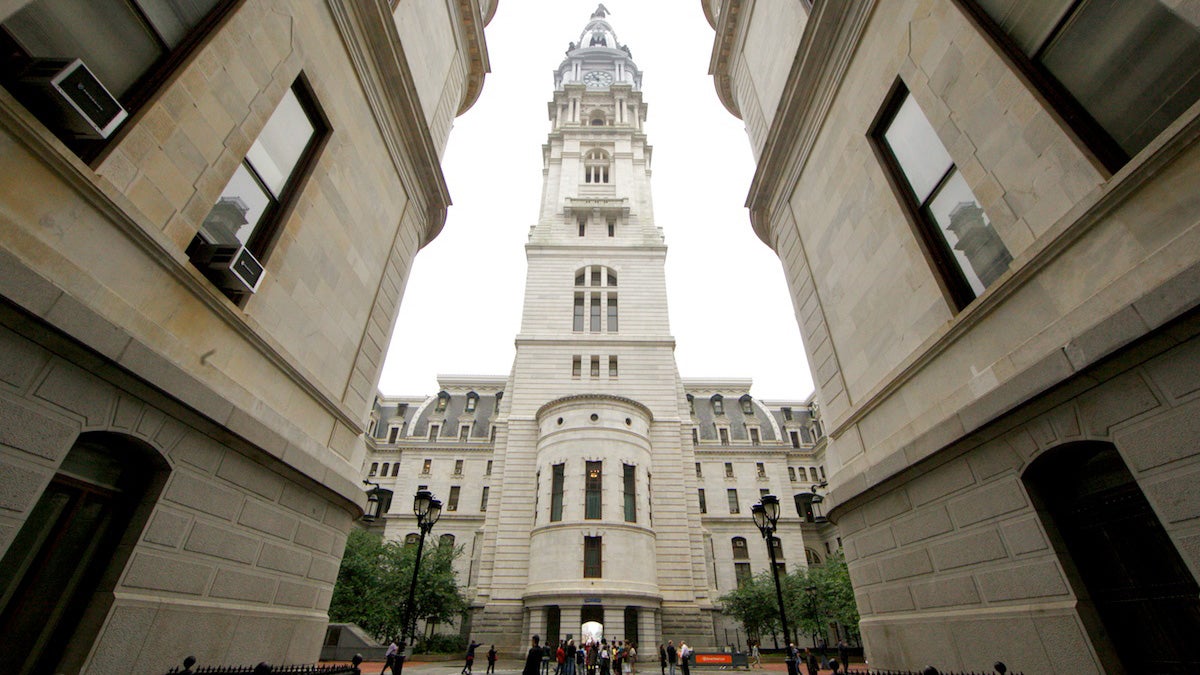Worker settlements with Philadelphia are common, costly, often confidential

Philadelphia's City Hall as seen from within the courtyard (Nathaniel Hamilton for NewsWorks)
A former Philadelphia paramedic at the center of a city Fire Department sex scandal in 2014 took a half-million in taxpayers’ dollars with her when she left her job last year.
A firefighter who took heat for her role in the 2014 line-of-duty death of firefighter Joyce Craig resigned as part of a $105,000 settlement — and recently returned to the job with a 10 percent jump in pay.
Those were two of the more controversial cases of Philadelphia employees whose work-related troubles resulted in high-dollar payouts.
But they weren’t alone.
The city paid more than $1 million to at least 17 city employees and ex-employees last year and so far this year to settle more than dozen lawsuits, labor complaints and other disputes that arose on the job, records show. Nearly three-quarters of those payouts involved sexual harassment or discrimination claims, and most arose from the police and fire departments, the complaints show.
The former paramedic, whose name WHYY is withholding due to the nature of the allegations, settled her claims against the city for $500,000 and 18 months of city-funded health insurance in July 2015, records show. The confidential agreement, under which the city admitted no wrongdoing, also required her to resign and give up her union grievance and any further claims, and both sides to “take no action” that would result in “unwanted or unfavorable publicity to the other,” records show.
Allegations that the mentally troubled young woman had sexual encounters with numerous firefighters, paramedics and supervisors in firehouses and vehicles while on- and off-duty around the city sparked investigations by the Fire Department, the city’s Inspector General and the Equal Employment Opportunity Commission and resulted in discipline for several firefighters. Her attorney Laura Mattiacci didn’t immediately respond to a request for comment.
About a month after the paramedic case ended, Nyree Bright, a firefighter, settled her dispute with the city for $105,000. Bright helped battle the blaze that killed Craig in West Oak Lane on Dec. 9, 2014, and went on unpaid medical leave afterward due to an unspecified “work-related injury,” according to the settlement agreement.
Under that deal, Bright agreed to resign and promised not to sue the city or pursue worker compensation claims.
Yet city payroll records show the Fire Department rehired her last month, with a 10 percent salary hike, as a firefighter and lieutenant.
A dearth of details
Andrew Thomas, president of Local 22, the firefighters and paramedics union, said he didn’t know the details of Bright’s and the paramedic’s settlement agreements, nor why Bright was rehired after resigning as part of her settlement. Bright and Capt. William Dixon, a fire spokesman, couldn’t be reached for comment. But mayoral spokesman Mike Dunn said: “There was nothing in the agreement that prevented Ms. Bright from future employment with any city department. She is now able and willing to return to work, and we are happy to have her.”
Since her return, Bright has been assigned to the Fire Academy for retraining and recertification, Thomas said.
In an internal report never publicly released but leaked to reporters, fire investigators identified crucial communications and training problems that contributed to Craig’s death, prompting her family to call for criminal charges.
Federal investigators with the National Institute for Safety and Health have completed their probe of the deadly blaze, said Nura Sadeghpour, a NIOSH spokeswoman. Their draft report remains under review, with a final report expected to be publicly released in January or February, she added.
Some other employment-related complaints that resulted in settlements held the headlines for weeks, while others went unnoticed:
Keisha Johnson, a police officer who left the department in 2012, filed an EEOC complaint against the city that same year, claiming her supervisor in the Internal Affairs unit coerced her into a sexual relationship. The case settled for $125,000 in July 2015.
N. Melville Jones, a gay police officer, was paid $60,000 last December to settle his claims of pervasive homophobia and an anti-LGBT workplace bias.
Stephanie Cucinotta, a police officer, accused a supervisor of sexually harassing her — and retaliating against her after she rejected his advances — in a federal lawsuit alleging gender and race discrimination. The city settled the case for $35,000 in June 2015.
Kimberly Byrd, a police sergeant who left the force in 2012, got $27,500 in June to settle a federal gender- and race-discrimination lawsuit she filed against former police Commissioner Charles Ramsey, who she claimed unfairly demoted her.
Theresa Brooks, a police officer who worked in narcotics, settled her federal sexual harassment complaint for $7,000 in July 2015. In her lawsuit, she claimed her male colleagues changed clothes and watched pornography in the operations room where she worked.
Doris Fernandes, a pediatrician who worked at a city health center in Powelton for 35 years, claimed the city fired her in November 2013 after she refused to prescribe birth control to patients because of her religious beliefs. The city paid $125,000 last September to settle her civil rights complaint.
Francis Dougherty, a firefighter, sued the city in federal court, along with a dozen other white firefighters, accusing former Commissioner Lloyd Ayers of passing them over for promotion in favor of black and Latino firefighters. He settled for $25,000 last March.
Matthew Maurizio, a police detective, filed a whistleblower lawsuit in 2014 that ended in a $17,500 payout in March. In his complaint, Maurizio accused his bosses of retaliating against him for reporting his fellow officers for “icing,” or holding citizens in jail without charges or even probable cause — a civil rights violation — to coerce cooperation or confessions.
The details of such payouts can remain a mystery to those beyond the involved parties, because they often come with confidentiality agreements. Such agreements don’t accompany every settlement, and can be demanded either by the city or the plaintiffs’ attorneys, Dunn said.
Confidentiality contradicts Pennsylvania law
Even so, any secrecy violates state law, one attorney said.
“Pennsylvania law is very clear, when a public agency like the city is involved in a settlement agreement, confidentiality clauses cannot be part of that agreement — and cannot be enforced under law,” said Melissa Melewsky, attorney for the Pennsylvania NewsMedia Association. “The terms of the settlement are just as relevant to the public as the payment of funds, because the public can’t hold public governmental agencies accountable if they don’t know what decisions are being made.”
One city watchdog said such settlements deserve more scrutiny because they offer employers lessons in creating better workplaces.
“With sexual harassment, like sexual assault, for the most part, people don’t file complaints. They continue to put up with it. The fact that people are coming forward is a really good sign,” said Carol E. Tracy, executive director of the Women’s Law Project. “Presumably there’s merit to these sexual harassment and discrimination cases if a complaint has been brought, negotiations took place, and a settlement was made. Taxpayer money could be better utilized in doing more prevention work.”
Dunn responded: “The city has existing sexual harassment and gender discrimination policies that are constantly under review in light of litigation and other factors … the city’s Equal Employment Office provides monthly training for supervisors and managers on how on how to spot instances of harassment and discrimination and how to report, document and discipline employees who have violated standards of conduct and city and departmental policies.
“At the requests of departments, EEO does on-site training for employees and trainees. And all allegations of sexual harassment are required to be reported to the law department, who may monitor and/or provide advice during the investigation of an allegation.”
Is $1 million-plus in payouts to disgruntled city workers a reform-worthy cause for concern — or just the cost of doing business?
That’s a tough question to answer, Dunn said.
“The total dollar amounts from year to year can fluctuate, because they are entirely dependent on when the cases are settled, and because a single, relatively large payment can skew an annual total. Thus it is hard to draw conclusions about trends,” Dunn said. “But these payments, individually and in the aggregate, are closely watched, both in terms of the payments and the underlying policy issues that the cases may pertain to. We have in some instances updated policies and provided additional training as part of settlement agreements.”
He added: “Philadelphia is a large city, and this is a large government with 25,000 employees carrying out a huge number of important services across a wide geographic region. Every dollar used in a settlement agreement is a concern to the city; officials closely monitor these settlement agreements, and we work very hard to keep the resulting payments to a minimum.”
This post has been updated.
WHYY is your source for fact-based, in-depth journalism and information. As a nonprofit organization, we rely on financial support from readers like you. Please give today.




